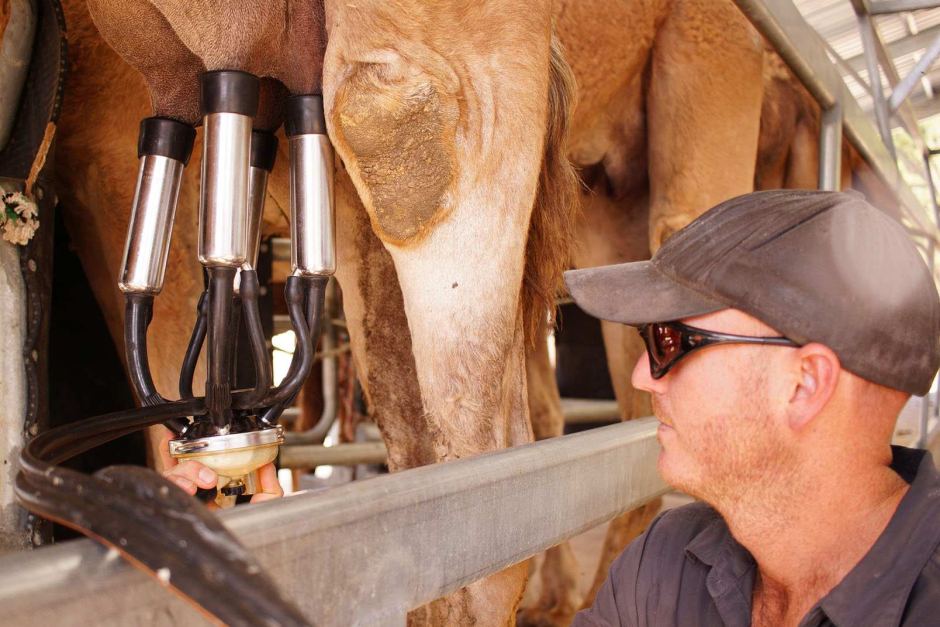Category: Livestock / Miscellaneous Animal Production / Business, Economics and Finance / Retail / Dairy Production
WA's first pasteurised camel's milk hits the market
Tuesday, 22 Nov 2016 16:19:59 | Laura Gartry

Good Earth Dairy manager Stephen Geppert milks a camel. (ABC News: Robert Koenig-Luck)
From coconut to lactose-free, almond to rice, consumers are faced with a growing array of choices when it comes to milk.
Now after years in development, pasteurised camel's milk from Western Australia's first commercial size camel dairy has joined the list.
More than 50 retail outlets have already signed up for the product, bottled on a dusty block in Dandaragan, 160 kilometres north of Perth.
Former WA Agriculture Minister Kim Chance is heading up the venture to harness WA's wild camel population to produce the milk.
"An operation of this size has never been done here before. We've got a 150 camels at the moment, milking 50 of them because that includes the babies. We are milking about 250 litres a day," he said.
"It's big step for us. We still have to raise awareness of the product within the public."
Good Earth Dairy sells 300ml bottles for around $8.00 and will soon launch a one litre bottle.
Export potential for WA's 'white gold'
At more than $20 a litre, camel milk is known as white gold.
It is low in lactose and fat, and said to be easier to digest than cow's milk.
It tastes a bit like a salty skim milk and the company claims it is the most similar product to human breast milk.
Fresh camel's milk is popular throughout the Middle East, Holland, the UK and the United States but it has not been widely available in Australia.
"Some stockists are doing extremely well … but the Australian market will always be limited because of the cost of product, we never expect we are going to rival cow milk in the long term," Mr Chance said.
The dairy plans to double its production within a year and has approval to take on another 250 camels.
Stage two of the expansion plan is to tap export markets for frozen and powdered camel dairy products.
Turning wild camels into milking machines
There are an estimated 750,000 wild camels roaming Australia's deserts, with millions spent on aerial culls.
"We think there is a better way, an opportunity to actually treat camels the way they should be treated. Because they are beautiful creatures, very affectionate and actually quite intelligent," Mr Chance said.
Rather than seeing them as a pest, the dairy takes on pregnant females and domesticates them for milking.
Dairy manager and cameleer Stephen Geppert trains the camels once they are mustered and trucked in from near Warburton.
"I get them to accept me as part of their pack and then as top of the pack and then I teach them what is acceptable and unacceptable behaviour," he said.
"To me they feel like 800-kilogram puppy dogs, very very friendly, but they are rather powerful."
Camel Milk Victoria was recently singled out at the CHOICE Shonky Awards for making false claims about the health benefits of camel milk.
The WA venture is taking a more cautious approach.
"We are working with West Australian universities, to try and get some Australian generated clinical evidence of the benefits other people that have claimed," Mr Chance said.
- About Us
- |
- Terms of Use
- |
-
 RSS
RSS - |
- Privacy Policy
- |
- Contact Us
- |
- Shanghai Call Center: 962288
- |
- Tip-off hotline: 52920043
- 沪ICP证:沪ICP备05050403号-1
- |
- 互联网新闻信息服务许可证:31120180004
- |
- 网络视听许可证:0909346
- |
- 广播电视节目制作许可证:沪字第354号
- |
- 增值电信业务经营许可证:沪B2-20120012
Copyright © 1999- Shanghai Daily. All rights reserved.Preferably viewed with Internet Explorer 8 or newer browsers.




 Send to Kindle
Send to Kindle

